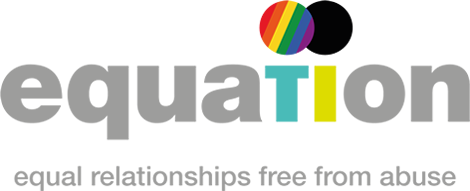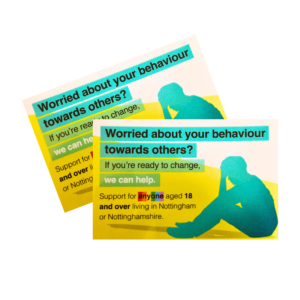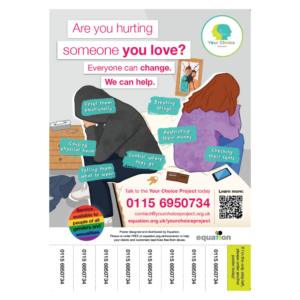Worried about your own behaviour?
Making someone feel controlled, anxious, isolated or scared, is abusive. There’s no excuse to make someone feel like this. Regardless of our circumstances, background, mental health, alcohol or drug use, we can all choose how we behave.
- Do you ever look through their phone?
- Do you ever try to control what they wear, or where they go?
- Do you ever accuse them of flirting with someone else?
- Do you ever think they are afraid of how you’ll react?
If you do any of these things and recognise this is wrong, at Equation, we can help you change it. The Your Choice Project is a programme available to anyone aged 18 and over living in Nottingham city or the wider county.
Our programme is delivered in line with Respect UK’s standards of practice to protect the safety and wellbeing of survivors, children and young people.
Why get help?
Getting help for abusive behaviour can have a positive impact, not only on you, but also your children and the people around you.
You might want help because
- You feel angry all of the time and you don’t want to
- You want your family to stay together
- You want a happy relationship with your partner
- You don’t want to hurt your children
- You want to feel happier and proud of your choices
Is it abuse?
Not sure if you’re experiencing domestic abuse? Read our guide
Warning signs
Learn to recognise the signs of domestic abuse
Get help
For yourself or someone else
Find out more about the Your Choice Project with our online webinar series.
How to get help
Your Choice Project
Your Choice Project is a voluntary domestic violence and abuse programme, delivered by Equation.
How does the programme work?
-
- Foundations Programme
- Second Step Programme
- Women’s Programme
- Step Up Parenting Programme
- Maintenance Programme
Foundations Programme
Early intervention and awareness building that looks at responsibility. It is designed for anyone who might be unsuitable for the Second Step programme. The programme runs for 8 weeks.
Second Step / Women’s Programme
An intervention behavioural change programme that creates a safe opportunity for behavioural change and a shift in attitude and beliefs. The programme runs for 24 weeks. The first 12 weeks focus on safer relationships and the second 12 weeks focus on a respectful relationships. Together these programmes address behaviour choices, denial, minimisation, blame, increasing self-awareness, different forms of abuse, attachment, accountability, boundaries, sexual respect, parenting and the impact on children.
Maintenance Programme
Monthly online one-to-one sessions for anyone completing the Second Step or Women’s Programme. This programme supports you to make long-term change and runs for up to 6 months.
Step Up Parenting Programme
This programme looks at the impact of domestic abuse on children and supports you in developing a safe and successful approach to parenting. The programme runs for 10 weeks.
Support for survivors of domestic abuse
Survivors can also receive up to 12 months support if the person abusing them is attending the Your Choice Project. This is to support their safety and wellbeing and to support them with the impact of what they’ve experienced. The project works in partnership with Juno Women’s Aid and Nottinghamshire Women’s Aid who provide support for partners, ex-partners and family members of perpetrators accessing interventions.
Am I eligible?
-
- You must be aged 18 or over and live in Nottinghamshire
- You must not be involved in ongoing criminal or family law proceedings relating to domestic abuse or child protection
- You must not have completed this or another programme in the last 6 months
- You will need to give details of family, current and ex-partners for safeguarding, risk monitoring and support to be offered.
- You must show motivation to change and acceptance of having used abusive behaviour
Will it work?
Taking part in any behaviour change programme is not a guarantee that things will be different, but it can create a shift in attitude. It’s an opportunity to choose to change and to be accountable for your choices in future, whilst having the support behind you.
Contact us
- Email contact@yourchoiceproject.org.uk or call 0115 6950 734
- Monday to Friday, 9am – 5pm excluding bank holidays.
Make a referral
I’m a frontline worker
Make a referral using this form.
I’m looking for help for myself
You can call us on 0115 6950 734 or email contact@yourchoiceproject.org.uk
You can also complete our referral form.
Giving these details will save time when we speak to you.
Professionals can make referrals on behalf of perpetrators. Perpetrators can themselves directly refer into service.
Referrals from professionals should be sent to the following email addresses using the referral form.
- contact@yourchoiceproject.org.uk (unsecure emails address – documents to be password protected)
- info@yourchoiceproject.cjsm.net (secure email address)
Where else you can get support
We know that sometimes it’s easier to speak to an organisation that isn’t local. It can feel safer to talk to someone you may never meet in person.
Respect UK – Equation is a member of Respect UK who are one of the leading organisations developing safe practices for working with male survivors, children, young people, and perpetrators of domestic abuse. They also run a helpline to support men and women who are using abuse, in same-sex or heterosexual relationships. Their team of Advisors will listen to you without judgment and offer you honest advice to help you stop being abusive to your partner ex-partner or family.
They also offer advice to concerned friends, family members and professionals working with individuals who use violence and abuse.
Respect Phoneline: 0808 802 4040.
Resources
Showing all 2 resultsSorted by popularity
Professionals
If you come into contact with people who are or could be experiencing domestic abuse as part of your work, join us for one of our short webinars and find out more about the support offered and how to make a referral.
Domestic abuse is a big issue
- 81% of survivors we surveyed said they thought perpetrator programmes are a good idea. However, only 2.5% of survivors told us their abusive partner went on a perpetrator programme (Every Story Matters, SafeLives, 2018)
- 107,855 survivors with high-risk perpetrators (72,290 new cases and 35,565 repeat cases) were heard at MARAC across England and Wales in 2020-21 (SafeLives, 2021)
- Domestic abuse makes up a large portion of the Crown Prosecution Service’s workload, receiving up to 70 calls an hour for charging decisions and accounted for 52% of CPS caseload for the first quarter of 2020 (Crown Prosecution Service, 2020)
- Domestic abuse crimes recorded by the Police in 2020-21 across England and Wales reached 845,734, which was an increase of 6% from the previous year (ONS, 2021)
- Perpetrator programmes are important because repeat victimisation and serial perpetration is common and no other crime has a repeat victimisation rate as high (Dodd, et al. 2004).
“The program has helped me improve my outlook on life and quality of life not only for me but for my partner and children”
“It has helped me see a different perspective on the way I approach things and helped me be more approachable parent for my daughters”
“I learnt that many of my problems started in my childhood and I’m not so skilled to be able to sort them on my own. I understand the importance of being calm under the pressure and having a discussion about life difficulties with my partner and children.”
“ I have learnt I am not perfect and I have learnt where I have gone wrong and how I could have deal with things in the past differently”


